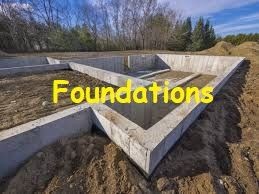The CRCA
Foundations
Over Christmas visitors from Brisbane told us how they had inspected a majestic Queenslander home – the kind you still frequently see in older suburbs around Brisbane. What put them off buying the house was the terrible slope in the floor of the main living area. While it might have been great for their boys for racing toy cars downhill they knew that some speedy renovations would need to be done. The problem lay in the foundations – some of the stumps under the house had settled considerably more than others.
Of course a slightly sloping floor in an older house is one problem – collapsing walls are another. Many years ago there was a housing estate, near where I lived, that had been built in paddocks where many decades earlier there had been a small quarry that had later been filled in. Over the years, as the ground continued to settle, some houses in that estate began to show a decided lean. While legal teams tried to work out who was responsible and who would pay for the damage, the problem became worse and before long some houses had walls braced with timber supports.
Jesus stressed the importance of good foundations when building houses. He once told a story about two builders. One built a house on sand, the other on rock. Storms and floods beat against both houses but the one on the rock survived the battering of the severest weather. The one built on sand came down with a rather spectacular crash.
Of course Jesus wasn’t really concerned about houses. He was concerned about us human beings. Like a house you and I need a good solid foundation on which to build our lives. That’s particularly relevant for us as we stand at the threshold of a new year. What foundation will you be building on during this new year? Answering that question is even more important than making New Year’s Resolutions.
Let me mention some examples of what I mean,
At the last federal election my wife took exception to something she read in a candidate’s election brochure. She phoned that candidate to discuss the matter. But she came away from the phone conversation quite upset. She remarked: “That candidate has no moral compass!” She may as well have said, “That person is like a building with a very wonky foundation.”
Recently I’ve been reading Lord Macaulay’s History of England. He tells of the fluctuating fortunes of the nation under successive rulers. Charles I was executed because he invited Scotland to participate in the English Civil War on his behalf. Under Charles II there was a time of relative peace and stability but when he died his brother James II took the throne. James ruled like a tyrant, dismissing Parliament whenever they opposed him. James made up the rules as he went along. When it all became too much for the nation there was a revolution. James fled to France and William, Prince of Orange, and his wife Mary, took over the throne in England. It seems to me that James II was another who was building on very shaky foundations.
So, what’s the foundation? That’s a little like asking, “What are the ethical and moral standards upon which we should build our lives as individuals and as a community?” That question has occupied generations of philosophers. Obviously it doesn’t work to have everyone make up their own rules as they go along. For example, in the Bible’s book of Judges, foundations were not considered very important. There’s a refrain that occurs often in Judges: “There was no king in Israel and everyone did what was right in their own eyes.” So it seems we need some ethical and moral guidelines and someone in authority to enforce those morals.
Some suggest that society needs to come to an agreed consensus on what is moral and what is immoral. But that only raises further questions. The foundations in Hitler’s Germany and in Stalin’s Russia were dramatically different from the foundations in the Australia of the 1940s.
When Jesus spoke about the two builders he was wrapping up his Sermon On The Mount. The clear implication of his words is that His teachings are foundations upon which we should build. However, The Sermon On The Mount is really just Jesus updating and applying the Law of God from the Old Testament for modern mankind. So, how are you going to be building your life on that foundation in this new year?
John Westendorp
When you subscribe to the blog, we will send you an e-mail when there are new updates on the site so you wouldn't miss them.


